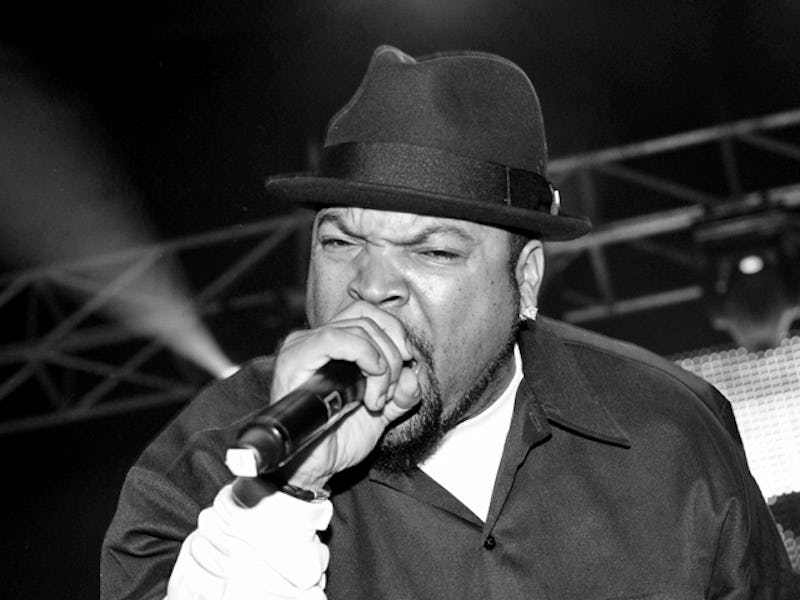Ice Cube’s "Fuck Tha Police" Is Not a Call to Violence
"You want people to go out in the streets and shout. You want people to go out protesting."

“I ain’t gonna change nothing I do, cause I aint doin’ nothing wrong,” rap legend Ice Cube said when asked whether he would cut “Fuck Tha Police” from his future sets in light of the recent Dallas shootings.
The protest song, originally released on N.W.A.’s Straight Outta Compton in 1988, echoes the anger and frustration expressed by supporters of the Black Lives Matter movement, but its perceived call to violence has many critics clamoring to censor the song for fear that it will incite listeners to act out in kind. Conservative commentator Bill O’Reilly said it was “very disturbing” that the song was still being distributed, and Bernard McGuirk called Ice Cube’s refusal to stop performing the song “beyond disgusting.” But James M. Jasper, Ph.D., a CUNY sociologist specializing in the emotions of protest, stands by Ice Cube’s refusal to self-censor. “Anger is a totally appropriate emotion for protesters,” he tells Inverse. “You want people to go out in the streets and shout. You want people to go out protesting.”
Music has played such a large part in protests throughout history because it creates a sense of solidarity by inciting strong emotion. “It makes you feel like you’re part of a bigger whole, or larger cause,” Jasper says. The emotional bond shared by people exposed to the same song — whether on the streets or online — can spur collective activities — dancing, marching, and chanting — all of which create a feeling of cohesion. In the Black Lives Matter movement, which has fought to gain recognition on the national level, this sort of mobilization is crucial. And using anger to fuel it is “totally appropriate,” Jasper says.
“You go to a protest to feel angry. You’re already angry. In some way you go to a protest to know you’re going to feel even angrier,” he explains. “Fuck Tha Police” is not a trigger; it’s an echo chamber. But what’s most crucial to realize is that it’s not, in itself, a call to violence.
What critics fail to understand is that the strong emotions aroused during a social movement or protest don’t necessarily translate into shootings, Jasper says. While MC Ren’s line on the original N.W.A. track — “I’m a sniper with a hell of a scope/Taking out a cop or two, they can’t cope with me” — is pointedly aggressive and especially uncomfortable to hear in light of recent events, it remains a vehicle for anger, not violence. “Music is neither necessary or sufficient for violence,” he says.
He does concede that music can make it easier for people with violent intent to actually act, explaining that putting on loud music could get the adrenaline flowing and make it easier to actually do something. But there is no evidence to says that violent music directly begets violence in a social movement. “It’s a powerful song,” he says. “But 99.999 percent of people who listen to it will not get a gun and start shooting at cops.”
One thing to keep in mind, he points out, is that the lyrics of a song are much less important than its musical elements — its beat, tempo, and melody — and shouldn’t be given too much weight. Even a song like “Fuck Tha Police”, in which Ice Cube declares there’ll be a “bloodbath of cops/Dying in L.A.”? “I wouldn’t worry about the lyrics so much as people do, especially for outsiders,” he says. “All they learn, all they see are the lyrics. They don’t experience the music. They aren’t there feeling the feelings of the music.”
That’s the point that Ice Cube’s critics are so blatantly missing. Yes, “Fuck Tha Police” is a shocking title for a song. Yes, its lyrics depict and defend alarming acts of violence. But focusing on what the song says is less important than asking why people want to listen to it. And perhaps understanding why is impossible to grasp unless you know how it feels to be compelled to do so. N.W.A.’s classic anthem is a song of protest, indignation, and outrage, feelings that are entirely appropriate given the frustration experienced by supporters of the Black Lives Matter movement — and feelings that are largely, consistently misunderstood by those watching from the outside.
During a recent march commemorating the brutal shootings of Alton Sterling and Philando Castile one sweltering evening in New York city, protestors marched on Times Square, tirelessly chanting “Hands up, don’t shoot,” and “Whose streets? Our streets.” But the crowd’s tone changed sharply as police forces started lining the sidewalks. Cries of “Fuck the police” began to surface above the din, echoing in waves throughout the crowd. Were people violent? Not at all. Were people angry? Of course they were. But they had every right to be.